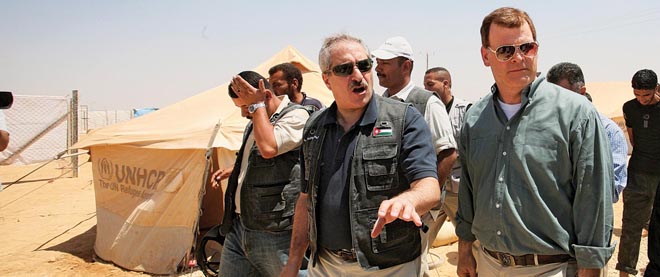Canada stuck with middleweight division
John Baird makes the rounds of the global middle powers
Mohammad Hannon/AP
Share

In the panoply of tools available to a cabinet minister, public remarks are always a sign that a written statement wasn’t thought to be enough. So Foreign Affairs Minister John Baird was sending a clear signal on Oct. 3 when he convened Ottawa reporters on short notice to condemn Syrian shelling of Turkish targets that left five Turkish civilians dead.
Turkish artillery had already fired back. Baird sided unequivocally with the Turks. “Canada strongly condemns, in no uncertain terms, this attack by the Assad regime across Syria’s border,” Baird told the cameras. It was an indication of support for Turkey that went above and beyond Canada’s minimum obligations.
It was not the first. In the 17 months since he became Foreign Affairs Minister after the 2011 election, Baird has been working to improve Canada’s relationship with a handful of countries around the world. The list includes Turkey, Indonesia, Nigeria and Vietnam. What the countries have in common is that they are big regional players with bright economic futures that at least balance their woes. In the 1980s, one might have called them “middle powers,” a list that has almost always included Canada.
Baird’s studied pursuit of these global middleweights marks an evolution in the Conservative government’s foreign policy. Support for Israel has been pretty much the only constant since 2006. The Prime Minister’s early enthusiasm for the so-called Anglosphere countries—the United States, Australia and Britain—vanished after conservative governments were defeated in the first two countries and Britain’s Labour government was replaced by a Conservative-led coalition that has little in common with Stephen Harper’s. Harper’s next big idea—this year’s pivot on energy exports from the United States to China—is turning out to be difficult to execute.
Suddenly a bunch of countries that function like so many far-flung Canadas are getting a lot of attention. “Minister Baird has made engaging with . . . emerging powers (‘next economies,’ as some call them) a definite priority,” Rick Roth, Baird’s press secretary, told me. “That’s one reason he is visiting Nigeria this week, for instance.
“To paraphrase Wayne Gretzky: you have to go to where the puck is going to be, not where it is.”
For most of a decade, the puck sure hasn’t been in Turkey. Successive Canadian governments have been frank about using the term “Armenian genocide” in relation to events in 1915. The Harper government has maintained that position since it came to power in 2006. As the Turkish embassy’s website notes, this “creates difficulties in Turkish-Canadian relations.”
But lately, it actually doesn’t. Gulcan Akoguz, the chargé d’affaires at the Turkish embassy in Ottawa, told me Baird’s personal involvement has accelerated a reassertion of normal relations, and more, between the two countries. “Canadian international relations is changing under Minister Baird,” Akoguz said.
There are now direct flights between Ankara and Toronto; flights to Montreal may soon be added. There have been preliminary discussions toward Canada-Turkey free trade, a Turkish consulate in Toronto has opened, and in August Ahmet Davutoglu became the first Turkish foreign minister to visit Ottawa in 14 years.
It was the same month that Baird welcomed Indonesia’s visiting foreign minister. Turkey’s population is 75 million, Indonesia’s 240 million; both populations are overwhelmingly Muslim. Nigeria, which Baird visited this month has 170 million people, half Muslim. Not every country on Baird’s list has a large Muslim population: Vietnam’s 88 million people include almost no Muslims, but its robust economy makes it, with Indonesia, a handy Asian counterweight to China. But it’s striking that so many countries on Baird’s list are largely Islamic. This reflects both the unsurprising news that about 1.6 billion people in the world are Muslim, and the slightly more surprising news that the Harper government has decided it cannot forever work around them.
Is there an electoral or immigration-related angle to the list of countries Baird is concentrating on? Not really. Canada’s Turkish and Indonesian minorities, combined, amount to fewer than 60,000 people. This emerging middle-power strategy seems pretty clearly to be about Canada trying to exert influence in the world, not about Conservatives seeking to improve their performance among Canadian voters.
In a sense it reflects lessons learned, often belatedly, after nearly a decade in power. And in the end, it is still a complex world with a lot of moving parts. Canada can’t prosper if it withdraws from the world, and it can’t have any influence unless it deepens its relationships with the countries that function as big regional players. The isolationism of the Harper government’s early years was a luxury Canada can no longer afford. In international relations as in so many things, this government has learned, and adjusted.